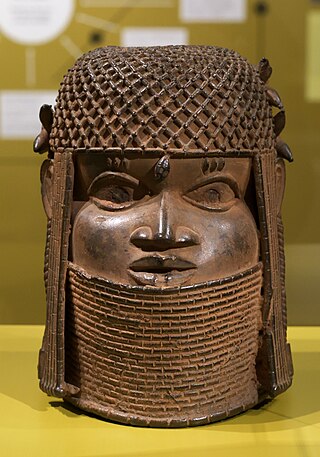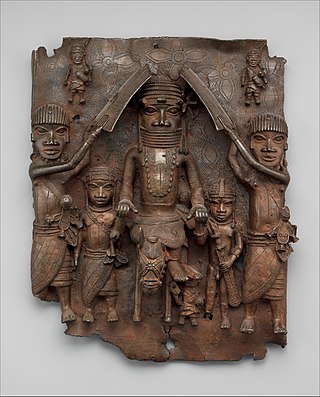
The Oba of Benin is the traditional ruler and the custodian of the culture of the Edo people and all Edoid people. The then Kingdom of Benin has continued to be mostly populated by the Edo.

Ewuare, originally known as Prince Ogun, was the twelfth Oba of the Benin Empire from 1440 until 1473. Ewuare became king in a violent coup against his brother Uwaifiokun which destroyed much of Benin City. After the war, Ewuare rebuilt much of the city of Benin, reformed political structures in the kingdom, greatly expanded the territory of the kingdom, and fostered the arts and festivals. He left a significant legacy in the Kingdom of Benin
The Kingdom of Ugu is a kingdom that exists in Nigeria, in what is now Edo State. The Edo State is also called Benin, though it is not to be confused with the country. The Kingdom of Ugu originated out of Igodomigodo in Nigeria.

Igue festival is a celebration with its origin in the Benin Kingdom of Edo State, southern Nigeria. One tradition states that the festival date coincided with the marriage of Ewuare to a wife named Ewere. Celebrated between Christmas and New Year, the festival includes the Oba's blessing of the land and his people. During the Igue ritual season, the Oba is prohibited from being in the presence of any non-native person.
Emotan was a market woman who traded in foodstuffs around the Oba Market in the ancient Benin kingdom during the reign of Oba Uwaifiokun and Prince Ogun, who later took the name "Oba Ewuare the Great" after becoming the Oba of Benin. She is the pioneer of the first day care centre in Benin City; oral history said she assisted Oba Ewuare in reclaiming the throne as Oba of Benin after several years in exile.
Unuamen also spelt Unuame is an ancient village community by Ovia river in Ovia North-East Local Government Area of Edo State, Nigeria. Unuame is about 15 kilometres (9 mi) from Benin City and 20 kilometres (12 mi) from Benin Airport. Unuame is one of the ancestral homes of Oba Esigie's maternal grandfather and home town to some group of Binis. The people of Unuame have remained loyal to the monarch since the establishment of the ancient Kingdom of Benin. Being a part of the Kingdom of Benin, Unuame is at the heart of the tropical rainforest in the southern part of Nigeria, way to the west of the delta of the Niger River and inland from the coast.
The Oba Market is an open-air market situated at Ring Road in the center of Benin City, Edo State, Nigeria. Its roots date back to the 15th century, making it one of the most historically significant markets in the region.

Oguola was the fifth Oba of the Benin Kingdom, reigning from 1280 AD to 1295 AD. His reign was marked by achievements in fortifying the city of Benin, enhancing its defences, and contributing to the cultural and economic development of the kingdom. Born into the royal family, Oguola's ascent to the throne was prompted by the extended absence of his elder brother, Prince Obuobu, who was engaged in military campaigns. This unorthodox succession was a pragmatic decision by the kingdom's elders and advisors to ensure stability and effective leadership during a critical period.
Obanosa, originally known as Prince Osifo, was the thirty-first Oba of the Benin Kingdom, reigning from c. 1804 AD – c. 1816 AD. His reign was marked by a notable conflict known as the Okpughe. Little is known about Obanosa's early life, including specific details about his birth date and place of birth. However, historical records indicate his royal lineage within the Benin Kingdom, and he ascended to the throne following the passing of his predecessor, Oba Akengbuda.
Eweka I was the first Oba of Benin and presided over the kingdom's shift from the Ogiso Dynasty to the establishment of the Obaship. His 35-year reign had a notable impact on the political, cultural, and traditional aspects of the kingdom. Before Eweka I's rule, the Benin Kingdom faced uncertainty due to the banishment of Owodo, the last Ogiso, for misrule. Oduduwa, who was the father of Oromiyan had been exiled to Uhe (Ife), which eventually set the stage for Eweka I's ascension to power. The turning point occurred when Oduduwa sent his son, Oromiyan, to Benin as an emissary. Oromiyan's arrival was met with resistance, leading to his settlement in Usama, on the outskirts of Benin City.
Ewedo, originally known as Prince Efabo, was the fourth Oba of the Kingdom of Benin who reigned from c. 1255 AD – c. 1280 AD. He was the only son and successor of Ehenmihen. He is credited with moving the seat of his government from Usama to the present palace site, introducing various gods and laws, and changing the name of the country from Ile or Ile-Ibinu to Ubini (Benin). He also reformed the political and administrative system of the kingdom, established a palace bureaucracy, and expanded the territory and influence of Benin.
Uwakhuahen was the second Oba of the Kingdom of Benin, reigning from 1235 AD to 1243 AD. He was the son of Eweka I, the initiator of the Oba dynasty and the inaugural ruler to bear the title Oba. Upon the demise of his father, he ascended to the throne, although he did not designate an heir apparent.

A Short History of Benin is a non-fiction book by Jacob Egharevba, first published in 1934 by the Church Mission Society Press in Lagos. The book offers a historical perspective on the Benin Empire, a pre-colonial African state now part of Nigeria. The book is an English version of the author's earlier work in Edo, Ekhere Vb' Itan Edo, which was published in 1933. The book explores the beginnings, culture, and political structure of the Benin Empire, as well as the events leading to its British invasion and Ovonramwen's exile in 1897. It also includes a chronology of the Obas (kings) of Benin from the 13th to the 20th century.
Udagbedo was the seventh Oba (king) of the Benin Empire, ruling from around 1299 to 1334. He was the second son of Oba Oguola and the brother of Oba Edoni. Udagbedo's rule saw the expansion of the Benin Empire to the Ga region, currently part of Ghana. His reign was marked by a dispute with Agbodo, a figure who resisted the Oba's authority and attempted to violate a tradition by planning his burial in the palace precinct.

Orhogbua was the seventeenth Oba of the Benin Kingdom who reigned around c. 1550 AD – c. 1578 AD. He was the son of Esigie and the grandson of Ozolua. Orhogbua was educated in a Portuguese colonial school and was baptised as a Catholic. He was able to communicate in Portuguese, both spoken and written. He established a military camp on Lagos Island, which served as a strategic location for empire expansion and trade control. He also introduced the use of native cooking salt in Benin.

Ehengbuda served as the eighteenth Oba of the Benin Empire, with a reign from c. 1578 AD – c. 1606 AD. Succeeding his father, Orhogbua, the first Oba to initiate contact with Europeans, Ehengbuda expanded the empire's territory westward and eastward, solidifying control over tributary states like the Oyo, Ekiti and Nupe. He also engaged in diplomacy and trade with the Portuguese and English, acquiring gifts such as a telescope. His death in a maritime storm while returning from a visit to his colony in Lagos marked the end of the era of warrior kings in Benin history, as the subsequent Obas delegated the command of the military to their chiefs.
Ohuan, originally known as Prince Odogbo, was the nineteenth Oba of Benin who ruled from circa 1606 AD to 1641 AD. He was the only son of Ehengbuda, and he succeeded his father after his death. He is known for his unusual birth story, his rebellion against his Iyase Ogina, and his expansion of the Benin Kingdom through warfare. He died without an heir, leading to a succession crisis and a decline of the kingdom.

Olua was the fourteenth Oba of Benin who reigned from c. 1473 AD – c. 1480 AD. He was the second child of Ewuare. Olua's reign is noted for his actions and the establishment of the Itsekiri kingdom through his son Iginuwa.

Ohen was the eighth Oba (monarch) of the Benin Kingdom, who ruled from c. 1334 AD – c. 1370 AD. He was the son and successor of Oba Oguola, who had conquered the Ekiti and Akure kingdoms and built the first moat around Benin City. He expanded the Benin Empire to the west and east, and increased its control over several tributary states. He also interacted with the Portuguese and the English, and received gifts such as a telescope from them.

Ewuakpe was the twenty-sixth Oba of Benin. Originally known as Idova, he was enthroned following his father Akenuzama's abdication due to old age. His ascension was intended to circumvent a prophecy by Ewuare the Great that foretold governmental upheaval under an Oba named Idova. However, his early rule faced resistance, with key figures and the general populace of Benin distancing themselves from palace activities and ceasing to provide necessary support for its operations. This led Ewuakpe to depart from Benin City and reside in Ikoka, the village of his mother, where he experienced additional adversity and engaged in humble tasks. The root of this widespread disapproval was traced back to a violent act he ordered during his mother's funeral. In a time of hardship, Ewuakpe sought the chiefs' support through traditional music and entreaty. A significant shift occurred when Iden, his spouse, consented to a ritual sacrifice to the gods, which resulted in the restoration of Ewuakpe's authority. This act influenced the chiefs to reaffirm their loyalty, thereby reinstating Ewuakpe's leadership. Following this event, Ewuakpe initiated reforms and strengthened his hold on power, which had a lasting impact on the kingdom's governance.










